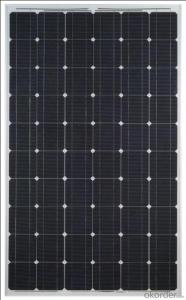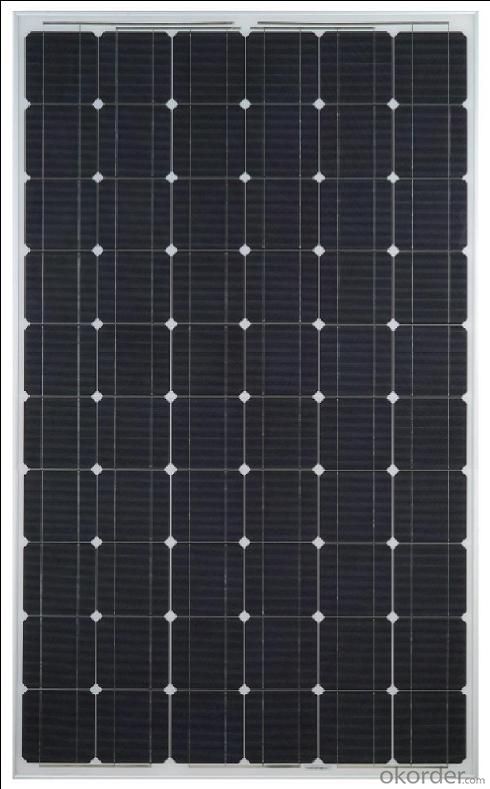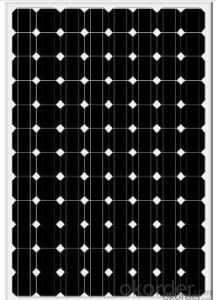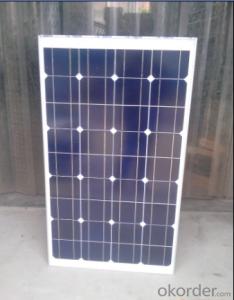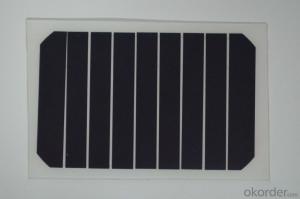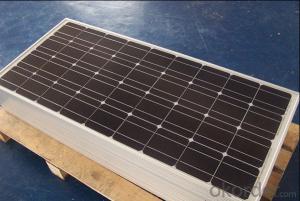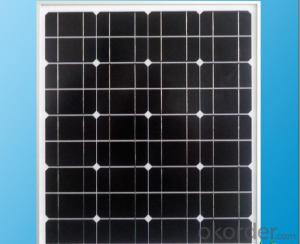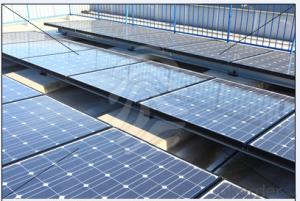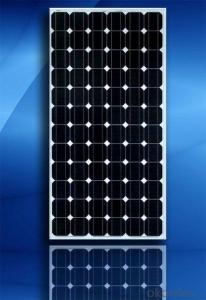300 Watts Monocrystalline Solar Panel with 25 Year Warranty CNBM
- Loading Port:
- Qingdao
- Payment Terms:
- TT OR LC
- Min Order Qty:
- 10 set
- Supply Capability:
- 300000 set/month
OKorder Service Pledge
OKorder Financial Service
You Might Also Like
Monocrystalline Solar Modules
We offers a range of small, medium and large monocrystalline solar modules, designed for a range of requirements.
Specifications:
Tolerance | +/- 3% |
Cell | Monocrystalline silicon solar cells |
N0. of Cells | 72 (12 x 6) |
Dimension of Modules (mm) | 1581 x 809 x 40 |
Weight (kg) | 15.5 |
Limits:
Operating Temperature | -40~+85? |
Storage Temperature | -40~+85? |
Maximum System Voltage | 1000 VDC max. |
Hail Impact | Diameter of 28mm with impact speed of 86km/h |
Temperature and Coefficients:
NOCT | 48C+/-2? |
Voltage temperature coefficient (%/K) | -0.34 |
Current temperature coefficient (%/K) | 0.09 |
Power temperature coefficient (%/K) | -0.37 |
Characteristics:
Model: | SGM-160D | SGM-165D | SGM-170D |
Max-power voltage Vmp (V) | 34.5 | 35.4 | 35.8 |
Max-power current Imp (A) | 4.64 | 4.66 | 4.75 |
Open-circuit voltage Voc (V) | 41.75 | 43.6 | 43.32 |
Short-Circuit Current Isc (A) | 5.32 | 5.08 | 5.38 |
Max-power Pm(W) | 160 | 165 | 170 |
Model: | SGM-175D | SGM-180D | SGM-185D |
Max-power voltage Vmp (V) | 36.1 | 36.2 | 36.2 |
Max-power current Imp (A) | 4.85 | 4.97 | 5.11 |
Open-circuit voltage Voc (V) | 43.68 | 43.8 | 44.8 |
Short-Circuit Current Isc (A) | 5.49 | 5.48 | 5.51 |
Max-power Pm(W) | 175 | 180 | 185 |
STC: Irradiance 1000W/m2, Module temperature 25?, AM=1.5
Monocrystalline Solar Panels Specifications Range
Maximum Power (Pm) | Dimension | Weight | Operating Voltage (Vmp) | Operating Current (Imp) | Open Circuit Voltage (Voc) | Short Circuit Current (Isc) |
3W | 158x241x25mm | 0.5kg | 8.5V | 0.36A | 10.5V | 0.4A |
4W | 308x166x25mm | 0.77kg | 8.5V | 0.47A | 10.5V | 0.54A |
4W | 308.x166x25mm | 0.77kg | 16.8V | 0.24A | 21V | 0.27A |
5W | 296x215x25mm | 0.3kg | 16.8V | 0.48a | 21V | 0.54A |
10W | 286x406x25mm | 1.5kg | 16.8V | 0.59A | 21V | 0.66A |
12W | 286x406x25mm | 1.5kg | 16.8V | 0.71A | 21V | 0.8A |
14W | 286x541x25mm | 2kg | 16.8V | 0.83A | 21V | 0.96A |
16W | 286x541x25mm | 2kg | 17.2V | 0.93A | 21.5V | 0.99A |
18W | 296x541x25mm | 2.4kg | 18.8V | 1.07A | 21V | 1.2A |
20W | 296x641x25mm | 2.4kg | 17.2V | 1.15A | 21.5V | 1.24A |
24W | 541x451x25mm | 3.15kg | 16.8V | 1.14A | 21V | 1.56A |
26W | 541x451x25mm | 3.15kg | 17.2V | 1.51A | 21.5V | 1.63A |
30W | 296x966x25mm | 3.85kg | 16.8V | 1.78A | 21V | 2.03A |
36W | 541x641x35mm | 4.7kg | 16.8V | 2.14a | 21V | 2.4A |
40W | 541x641x35mm | 4.7kg | 17.2V | 2.33A | 21.5V | 2.5A |
55W | 1057x457x35mm | 6.6kg | 17.6V | 3.12A | 21.6V | 3.3A |
70W | 546x1196x35mm | 8.5kg | 16.8V | 4.15A | 21V | 4.7A |
75W | 546x1196x35mm | 8.5kg | 17.2V | 4.36A | 21.5V | 4.8A |
80W | 546x1196x35mm | 8.5kg | 17.6V | 4.55A | 21.6V | 4.9A |
110W | 1066x811x40mm | 11.8kg | 17.6V | 6.25A | 21.6V | 6.6A |
150W | 1066x811x40mm | 14kg | 34.4V | 4.36A | 43.2V | 4.7A |
- Q: I want to install a solar panel on my car. I want to know that how much energy can be generated by a panel of size 4 foot by 6 foot. and the cost of installation.
- A little more than 0 watts per square foot, so that size panel would generate 250 watts under ideal conditions, which is noon on a sunny but not too hot day, near the equator. That's about /3 horsepower, or the same power as a man working hard. That is larger than needed to keep the battery of the car charged, unless you plan to run a laptop or something off it at night. The power is also too small to power the car for driving. If it's an electric car, you could get maybe another 2 miles per day out of the car, again, under ideal conditions. An RV store might have an idea of how much installation would cost. They would be accustomed to solar panels for RV's, but probably not small cars. A panel of that size would cost perhaps $500-800 just for the panel.
- Q: I heard the wind turbines, solar panels so far provide America with around 2% of our energy. So since liberals appear to want to replace natural energy with man made products, that cause massive pollution by the way to make- How long will that take 30 years, 00 years? How many Wind Turbines will Airplanes and birds and parachute jumpers smash into, isn't that a problem? How do we rid of natural energy before we have the LIBERAL BACK UP PLAN - WE DON'T REALLY HAVE ? How do they think this is gonna work? Its not logical, we need to come up with more ideas! That Battery idea kinda sucks since Batteries Need natural energy to work.
- Green technology at this stage is not viable for the long run...we don't have the technology as of yet to replace all other modes of energy...Windmill Farms are EXTREMELY ugly and kills thousands of birds and only work when the wind is actually blowing...solar is not ready for prime time, too expensive for the average joe...we should be pursuing other engines that would use less gasoline and some exist but nobody is promoting those because they are convinced electric cars are the way to go but those are a farce because we don't generate enough electricity now for homes to use, can you imagine how little we would have if all cars starting using that same energy? IT is a farce that during an economic crisis the current powers that be are wasting money on green technology garbage that won't work. We should be figuring out how to drill our own oil and get off foreign sources and build more plants to produce more electricity, not figure out how to use the little electricity we currently produce in all our vehicles...Liberals...what a concept.
- Q: What are the benefits of using solar panels?
- There are several benefits of using solar panels. Firstly, they provide a clean and renewable source of energy, reducing the dependence on fossil fuels and decreasing carbon emissions. Solar panels also help to lower electricity bills by generating free electricity from sunlight. Additionally, they require very little maintenance and have a long lifespan, making them a cost-effective investment. Furthermore, solar panels can increase the value of a property and provide energy independence, especially in remote areas or during power outages. Overall, using solar panels promotes sustainability, saves money, and contributes to a greener environment.
- Q: Does anyone know how I would go about hooking up the air conditioners in my house to solar panels? I would want just the air conditioners to be powered by solar energy. How could I hook it up where the panels can absorb energy from the sun during the day, and save and store the energy so I can run the air conditioners at night? I really feel that in the long run, this would save a lot of money with the energy bill. It's the use of the air conditioners that drive up the bill. Is this idea feasible? Is it also possible to have some sort of hybrid system where I can switch from solar to my regular local energy source when I want to?
- There are solar air conditioners. They don't use electricity. Most anyway. The number of photovoltaic panels you would need to run a standard electric air conditioner would cover most of the homes on the block. Read about heat pumps, Thermal storage, swamp coolers, solar heating to get an idea of what is practical. Most solar systems are hybrid because of clouds and nightfall. The best solar homes are designed from the ground up. With plenty of insulation, the right size and orientation of windows and collectors. Putting solar on an existing structure is going to be a misfit half donkey job unless you are very lucky.
- Q: I want to build solar panels for my house.Dose anyone try okorder is this really work?
- Build okorder
- Q: How do solar panels impact wildlife?
- Solar panels have minimal impact on wildlife compared to other forms of energy generation. While there may be some concerns about the disruption of habitats during installation, once operational, solar panels do not emit greenhouse gases or pollutants, reducing air and water pollution that can harm wildlife. Additionally, solar panels typically occupy a small fraction of land and can be installed on rooftops or in areas with limited biodiversity, minimizing the impact on wildlife habitats.
- Q: Monocrystalline panels are sooo expensive! Thanks for reading.
- Since you are asking for a rather technical answer you should be aware that solar panels come in several varieties. Two broad categories are photovoltaic panels which have achieved marketable efficiencies of around 24% and solar thermal panels which are routinely achieving efficiencies of between 60 to 80% while they are also much cheaper than photovoltaic panels. So the short answer is solar thermal panels. But what can you do with solar thermal energy. The answer is just about everything you can do with light energy. Sometimes additional equipment makes the efficiency drop to near that of photovoltaic panels. The trick is to keep the devices as simple and as efficient as possible. Solar thermal can of course be used to heat our homes. But it can also be used directly for air conditioning. The type of air conditioner uses a slightly different principal but it is one of the oldest that was once used in ice houses before refrigerators. It is known as an absorption system. At some point you may want to make electricity from the sun's heat. The most efficient commercial systems are not photovoltaic but solar thermal. There are several commercial systems where increased scale improves efficiency. The most efficient is a solar parabolic dish system combined with a stirling engine. At around 30% efficiency it beats photovoltaic and other thermal systems. At this level of commercial development, the various systems are more often described as solar collectors rather than panels.
- Q: Can solar panels be installed on a deck or patio?
- Yes, solar panels can be installed on a deck or patio. In fact, these areas can often be ideal locations for solar panel installations as they are typically unobstructed by shade and have ample sunlight exposure. Additionally, installing solar panels on a deck or patio can help maximize the use of available space and may provide an aesthetically pleasing solution for homeowners. However, it is important to consult with a professional to determine the feasibility and structural integrity of the deck or patio for supporting the weight of the panels.
- Q: Can solar panels be used for powering wireless charging stations?
- Yes, solar panels can be used to power wireless charging stations. Solar panels convert sunlight into electricity, which can be utilized to charge devices wirelessly through a charging station. This makes it a sustainable and environmentally friendly option for providing power to wireless charging stations.
- Q: My dad owns a restaurant, and we are doing farely well, but we were thinking on installing solar panels to minimize electricity costs (and of course make it greener). My dad would like to hear some numbers on the price in today (August 29/202) and savings he could possibly make over the years. So In Total Here's What I'm Asking:) Would it be hard to install?2) Maintanence?3) Monthly Expense? (None?)4) Price?5) Savings over time?6) Pros/ConsThank you so much!
- This is highly sensitive to your geographical location, and what the roof looks like. If there isn't a large, flat area clear of shadows, it will be a hard proposition. The best thing is to contact a local solar installer for a quote. On Y!A, we can't come close without actually walking the roof. In general, few restaurants opt for solar power today. That suggests that it's not very good payback in that situation.
Send your message to us
300 Watts Monocrystalline Solar Panel with 25 Year Warranty CNBM
- Loading Port:
- Qingdao
- Payment Terms:
- TT OR LC
- Min Order Qty:
- 10 set
- Supply Capability:
- 300000 set/month
OKorder Service Pledge
OKorder Financial Service
Similar products
Hot products
Hot Searches
Related keywords
